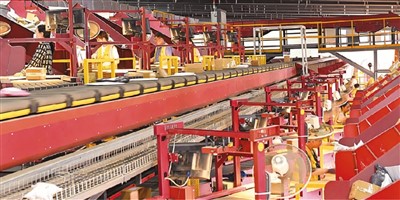Smart logistics bolsters commodities flow

Employees work at a distribution center of Chinese express delivery firm Yunda Express in a logistics park in Shuyang county, east China's Jiangsu Province. (Photo/Zhou Yong)
China's logistics sector has experienced rapid growth, thanks to the application of digital technologies such as big data, the Internet of Things, and artificial intelligence, leading to a faster flow of commodities and an increasingly efficient distribution system.
Recently, Chinese express delivery companies have been expanding cold-chain logistics facilities to ensure product freshness. This is in response to the escalating demand for deliveries, particularly for perishable products such as lychees, cherries, crayfish, ice creams, and ready-to-cook dishes.
These companies have extended their cold-chain logistics service networks to rural areas and expanded the sales area of agricultural products.
In Jiangjin district of Chongqing Municipality, southwest China, freshly harvested Sichuan peppers from a local planting base are sent directly to a nearby cold storage facility for packaging. From there, they are moved to a cold-chain parcel collection center less than 100 meters away and dispatched to locations across the country on the same day.
As of June 24 this year, China had handled 60 billion parcels, according to the country's State Post Bureau.
Many courier companies have adopted a method that involves shipping parcels from the warehouse closest to a customer's delivery address, leveraging big data analysis in the process.
This approach optimizes the allocation of resources in all facets of logistics. Big data analysis enables more precise matching of supply and demand, effectively reducing costs and enhancing efficiency, according to Liu Dacheng, deputy director of the Institute of Internet Industry at Tsinghua University.
Express delivery enterprises are vigorously improving their digital operations, optimizing transit and delivery processes. They are hastening the application of fully automated sorters, unmanned warehouses, unmanned vehicles, drones, and other technological equipment, all aimed at enhancing the efficiency of delivery services.
"Real-time information about each cargo truck is displayed on our digital logistics platform. By applying positioning technology and a big data processing system, we achieve fully automated logistics," stated an executive of FAW Logistics Co., Ltd.
Safety, efficiency, and price are the three key factors that drive intelligent logistics. Logistics equipment such as automated guided vehicles and autonomous mobile robots are widely employed, noted Liu Bin, an expert at JD Logistics' intelligent logistics park, a division of Chinese leading e-commerce company, JD.com.
In 2022, the National Development and Reform Commission introduced plans for a modern distribution system over the 14th Five-Year Plan period (2021-2025). The plans emphasized the need to accelerate the development of intelligent logistics and utilize modern information technologies and intelligent equipment to make logistics more automated and smarter.
While delivering smart logistics services, some Chinese courier companies are working towards green development.
At an outlet of Chinese express delivery company ZTO Express in Linyi city, east China's Shandong Province, several hundred numbered blue mail bags were used for packaging.
According to the outlet manager, each bag was equipped with a chip, allowing mail bags to be reused for four to six months. These chips facilitate the collection of real-time information about parcel delivery, making it possible to track the parcels throughout the transport process.
Photos
Related Stories
- China's weekly road logistics price index edges down
- China's logistics activity picks up pace in June
- China's logistics market sustains expansion, further recovery expected
- China's logistics industry shows vitality with sound recovery momentum
- China's road logistics price index flat in May
- China's logistics sector expands in first 4 months
Copyright © 2023 People's Daily Online. All Rights Reserved.









